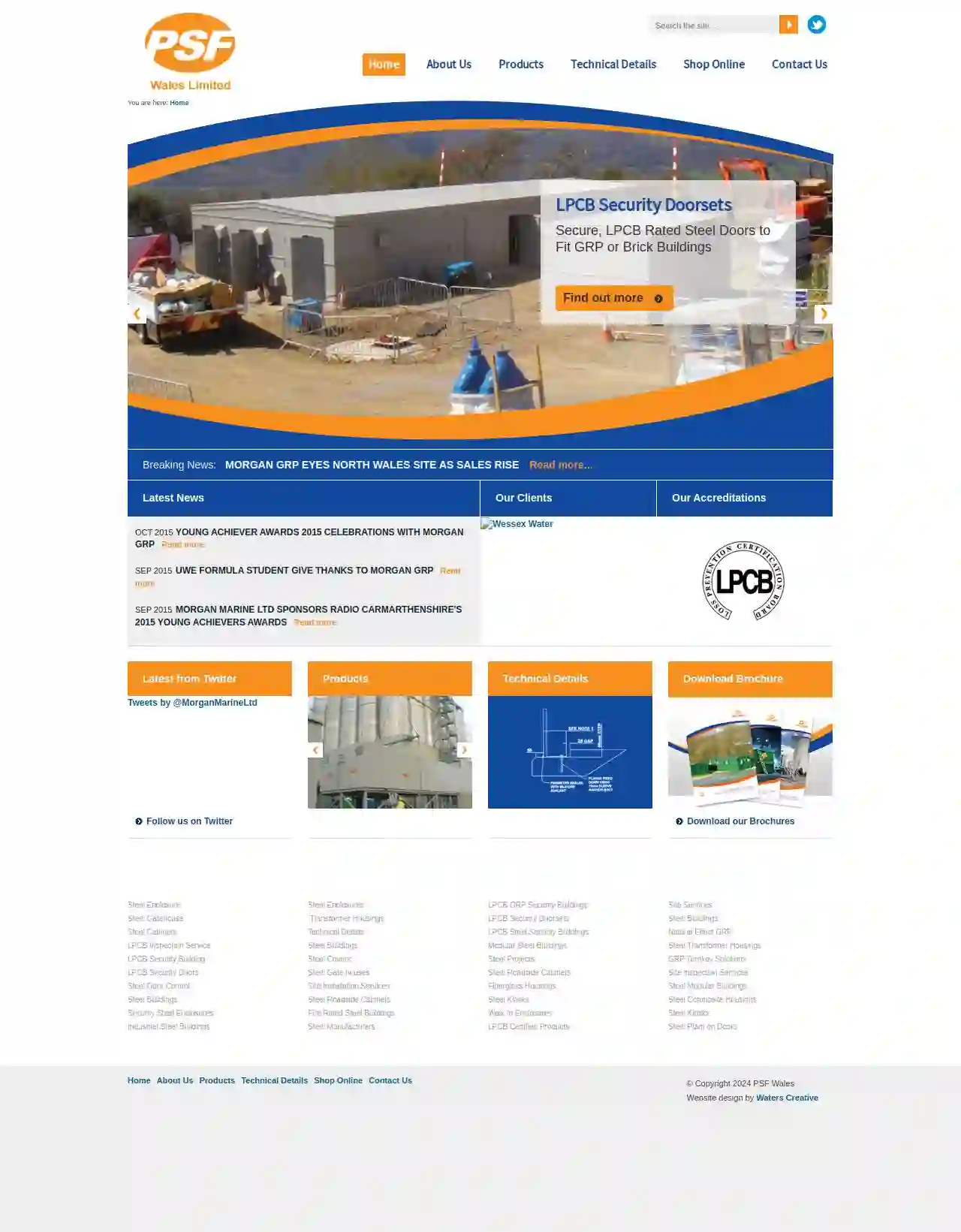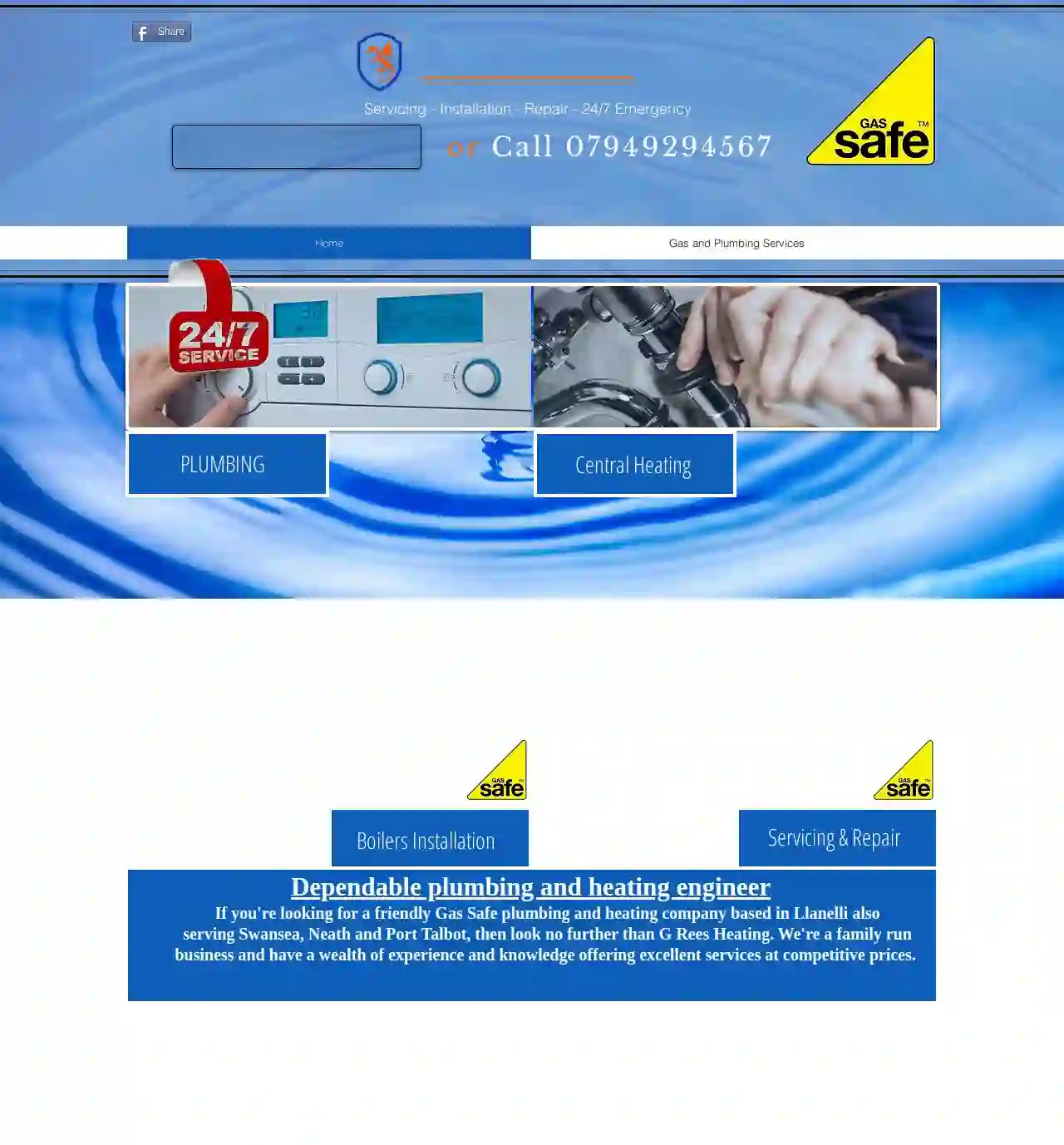Emergency HVAC Kidwelly
Find top After Hours HVAC in Kidwelly
Get 3 FREE Emergency HVAC quotes for your project today! Compare profiles, reviews, accreditations, portfolio, etc... and choose the best service.

P S F Wales Ltd
Llanelli, GBPSF Wales is a leading manufacturer of steel security enclosures, buildings, and access platforms. With a commitment to quality and innovation, we provide a wide range of products designed to meet the specific needs of our clients. Our team of experienced engineers and fabricators work closely with customers to ensure that their projects are completed to the highest standards. We are proud to be accredited by the Loss Prevention Certification Board (LPCB), which certifies our products to meet rigorous security standards. Our products are used in a variety of applications, including security, industrial, and commercial. At PSF Wales, we are dedicated to providing our clients with exceptional service and support. We offer a comprehensive range of services, including design, fabrication, installation, and maintenance. Our team is always available to answer your questions and provide expert advice. Contact us today to learn more about our products and services.
- Services
- Why Us?
- Accreditations
- Gallery
Get Quote
Thermal Earth
4.240 reviewsCapel Hendre Industrial Estate, Ammanford, SA18 3SJ, GB- Services
- Why Us?
- Accreditations
- Gallery
Get Quote
Harry Heating
51 reviewsLlanddarog Road, Maes Yr Haf, Carmarthen, SA32 8AL, GBWelcome to Harry Heating, est. 1998. Home of plumbing and heating in South Wales. Harry Heating serves Bridgend, Carmarthen and the surrounding areas. Harry Heating plumbing and heating specialists serving Bridgend, Carmarthen and the surrounding areas. Gwyn Harry has 35 years worth of experience as a qualified plumbing and heating engineer. He was trained by British Gas and has been operating individually as Harry Heating since 1998. Ex British Gas Engineer Gas Safe Registered A.C.S Approved Indentured Plumber City and Guilds London Institute Certified 35 Years Experience No Call Out Charge Get in touch on 07971546286 or fill out the contact form to discuss your plumbing and heating needs.
- Services
- Why Us?
- Accreditations
- Our Team
- Gallery
Get Quote
H2O Heating and gas services ltd
4.845 reviewsY Garth Capel Seion Road, Drefach, SA14 7BN, GBWe provide quality heating services across South West Wales and the surrounding areas. If you require cost effective, reliable heating and plumbing engineers then look no further. We cater to all domestic and business customer's central heating systems, gas & oil services and plumbing requirements. We have the knowledge and expertise needed to ensure that you receive nothing but the best service. Our reputation has been developed through hard work and reliability which is why we are the area's number one choice for gas, oil and plumbing related work. We are a Worcester Accredited Installer Worcester Accredited installers are recognised domestic and commercial heating companies that meet or exceed the standards of sustained quality of installation, service and customer care. These installers are accessible, through the official Worcester Bosch website. Worcester Bosch ensure our clients receive a high standard of workmanship and professionalism, our accredited companies are monitored by several recognised trade and industry bodies. To ensure our customers receive a high standard of workmanship and professionalism our company is accredited and monitored by several trade and industry bodies. We offer you the highest quality workmanship and services
- Services
- Why Us?
- Accreditations
- Gallery
Get Quote
Multi Heat Solutions
524 reviewsClos Rebecca, Llanelli, SA14 6AX, GBMultiheat Solutions is a reliable and professional plumbing and heating service provider. We offer a wide range of residential plumbing and heating services, including boiler servicing, maintenance, and breakdowns, as well as plumbing maintenance, repair, replacement, and installation. Our team of experts is dedicated to providing exceptional service and exceeding customer expectations. We are OFTEC registered, Gas Safe registered, and registered for the installation and maintenance of oil-fired appliances, as well as natural gas and LPG appliances. We strive to be in constant communication with our customers until the job is done and offer a 24-hour emergency service. Contact us today to get a free quote or to schedule a service.
- Services
- Why Us?
- Accreditations
- Gallery
Get Quote
First Choice Energy Ltd
4.619 reviewsLlanelli, GBFirst Choice Energy is a company dedicated to helping UK families achieve energy efficiency in their homes. We understand that the average person spends a significant amount of time at home, making energy consumption a major factor. Our mission is to create a more sustainable world by reducing this consumption and saving homeowners money. We achieve this by offering a range of services, including installing eco-friendly boilers and providing various insulation solutions like cavity wall insulation, cavity wall extraction, loft insulation, and floor insulation. We also offer boiler grants to make these upgrades more accessible. We believe that by making homes more energy efficient, we can create a positive impact on both the environment and individual households.
- Services
- Why Us?
- Accreditations
- Gallery
Get Quote
G Rees Heating
4.8125 reviewsLlanelli, GBG Rees Heating is a family run business based in Llanelli, serving Swansea, Neath and Port Talbot. We have a wealth of experience and knowledge offering excellent services at competitive prices. We are a Gas Safe registered plumbing and heating company.
- Services
- Why Us?
- Gallery
Get Quote
MrAc Air Conditioning
517 reviewsMrAc 16 Penybedd Pembrey Burry Port, SA16 0HJ, GBWelcome to MRAC Ltd Air Conditioning, a rapidly growing South and West Wales company specialising in commercial & residential air conditioning. Based in Carmarthenshire, we cover all areas around us including Pembrokeshire, Glamorgan and further afield, even working in London. Our aim is to offer you the highest quality air-conditioning products at an unbeatable price. Whether you choose cooling only systems or dual purpose heating and cooling systems, air conditioning is definitely the commodity of the future. We supply, install, repair, relocate and maintain AC, Cellar cooling systems and air source heat pumps. Contact us now. Phone – 01554 541289Email – [email protected]
- Services
- Why Us?
- Our Team
- Gallery
Get Quote
Hotpoint Repairs Camarthenshire
Llanelli, GBExpert appliance repairs by Hotpoint. It couldn’t be easier to get your appliance repaired back to full working order. With nationwide coverage, fully qualified engineers and a full 12 month repair guarantee, simply book your repair online or call to speak to one of our advisors. We repair all large domestic appliances such as washing machines, refrigerators, dishwashers, cookers & tumble dryers, and service major brands including Hotpoint, Whirlpool, Indesit, Cannon and Creda. Choose from a fixed price repair or opt for one of monthly payment options which also benefit from additional maintenance and support cover.
- Services
- Why Us?
- Gallery
Get Quote
Renewable Heating Wales
4.414 reviewsLlanelli, GBRenewable Heating Wales has years of experience in designing, supplying, installing and maintaining renewable heating and MVHR systems for domestic and commercial spaces throughout the UK. We are specialists in air and ground source heat pump installation with over 10 years of experience and hundreds of heat pump projects completed by our team. RHW work closely with Stiebel Eltron and Mitsubishi ECODAN products. As Stiebel Eltron and Mitsubishi Advanced installers we deliver heat pumps that we know and trust to work, with 7 years guarantees. RHW provide a single point of responsibility for design for all your total build needs Air source heat pumps, Ground source heat pumps, MVHR and Solar PV specification and performance to MCS standards, an important factor if you intend to claim under the Governments Funding for Heat Pumps Scheme. Our installations are project managed by our operations team to integrate with your build program. We liaise with your main contractor and tradespeople to coordinate site planning and project delivery. From initial design to final handover, RHW will cover every aspect of your renewable heating installation. Contact us today to see how we can help with your project.
- Services
- Why Us?
- Our Team
- Testimonials
- Gallery
Get Quote
Over 12,692+ HVAC Companies on our platform
Our HVAC pros operate in Kidwelly & beyond!
HVACCompaniesHub has curated and vetted Top HVAC Companies in Kidwelly. Find a top & reliable business today.
Frequently Asked Questions About Emergency HVAC Services
- Uneven Temperatures: Some rooms in your house might be significantly hotter or colder than others.
- High Energy Bills: An undersized or oversized system will be inefficient and increase your utility costs.
- Frequent Cycling: An oversized system will turn on and off too frequently, which can lead to premature wear and tear.
- Poor Humidity Control: Incorrect sizing can cause inadequate humidity control.
Are emergency HVAC services more expensive?
How can I tell if my HVAC system is the correct size for my home?
What is a dehumidifier, and do I need one?
What is carbon monoxide, and how can it affect my HVAC system?
Are emergency HVAC services more expensive?
How can I tell if my HVAC system is the correct size for my home?
- Uneven Temperatures: Some rooms in your house might be significantly hotter or colder than others.
- High Energy Bills: An undersized or oversized system will be inefficient and increase your utility costs.
- Frequent Cycling: An incorrectly sized AC unit will turn on and off too frequently, reducing its lifespan.
- Poor Humidity Control: The system may not effectively control humidity levels, leading to discomfort or mold problems.